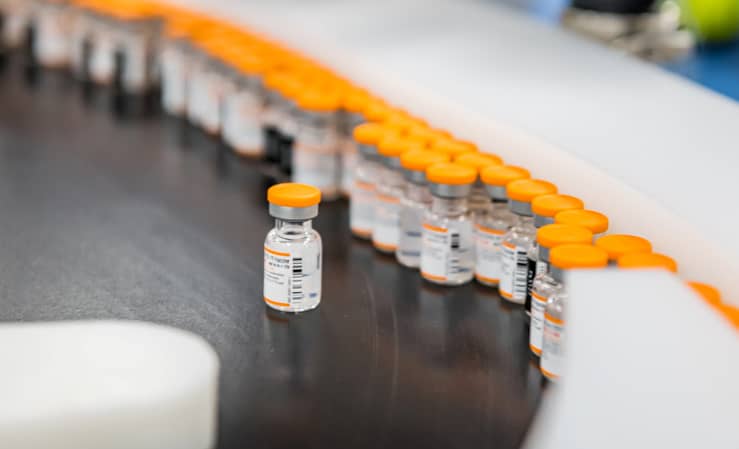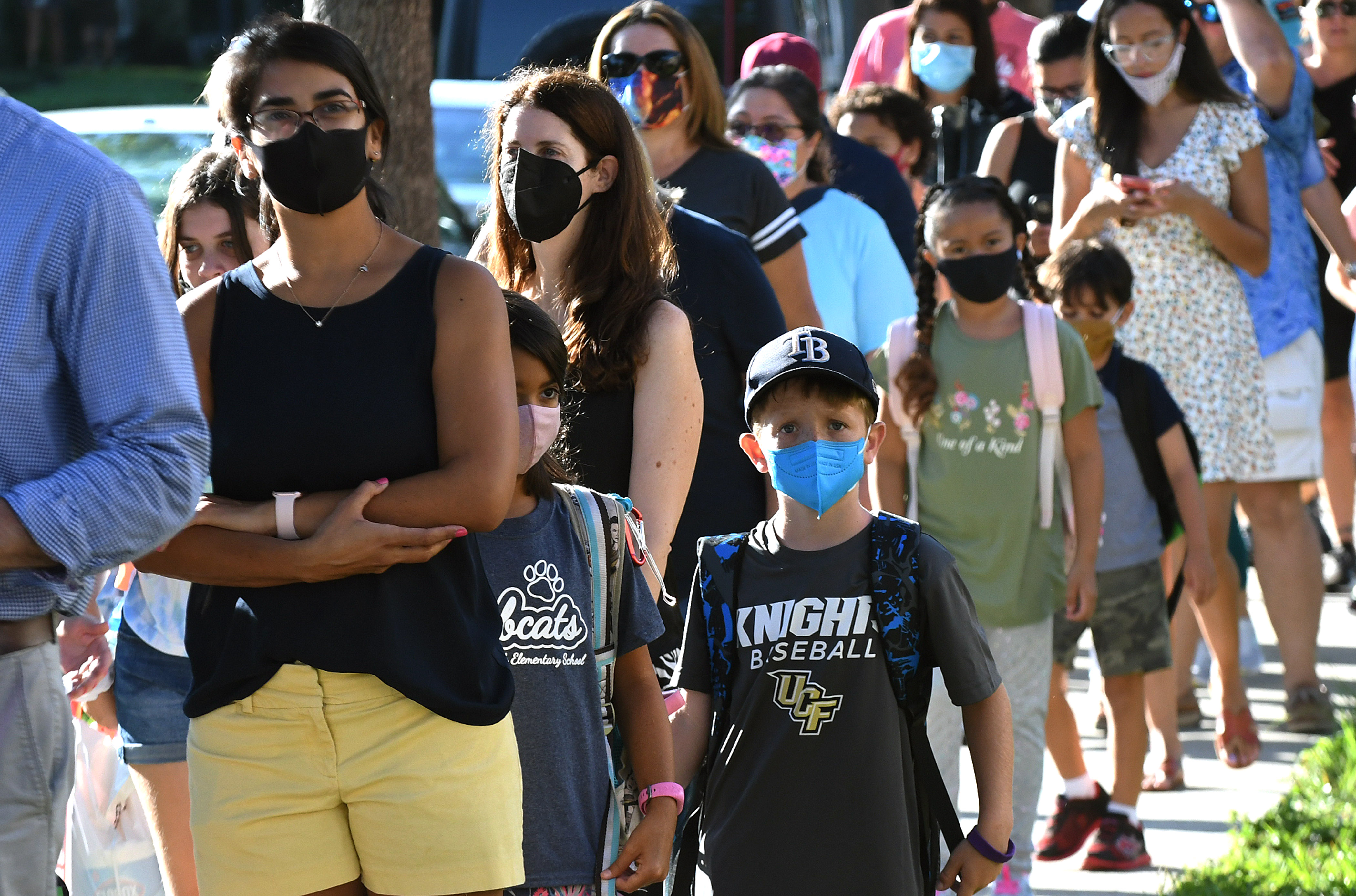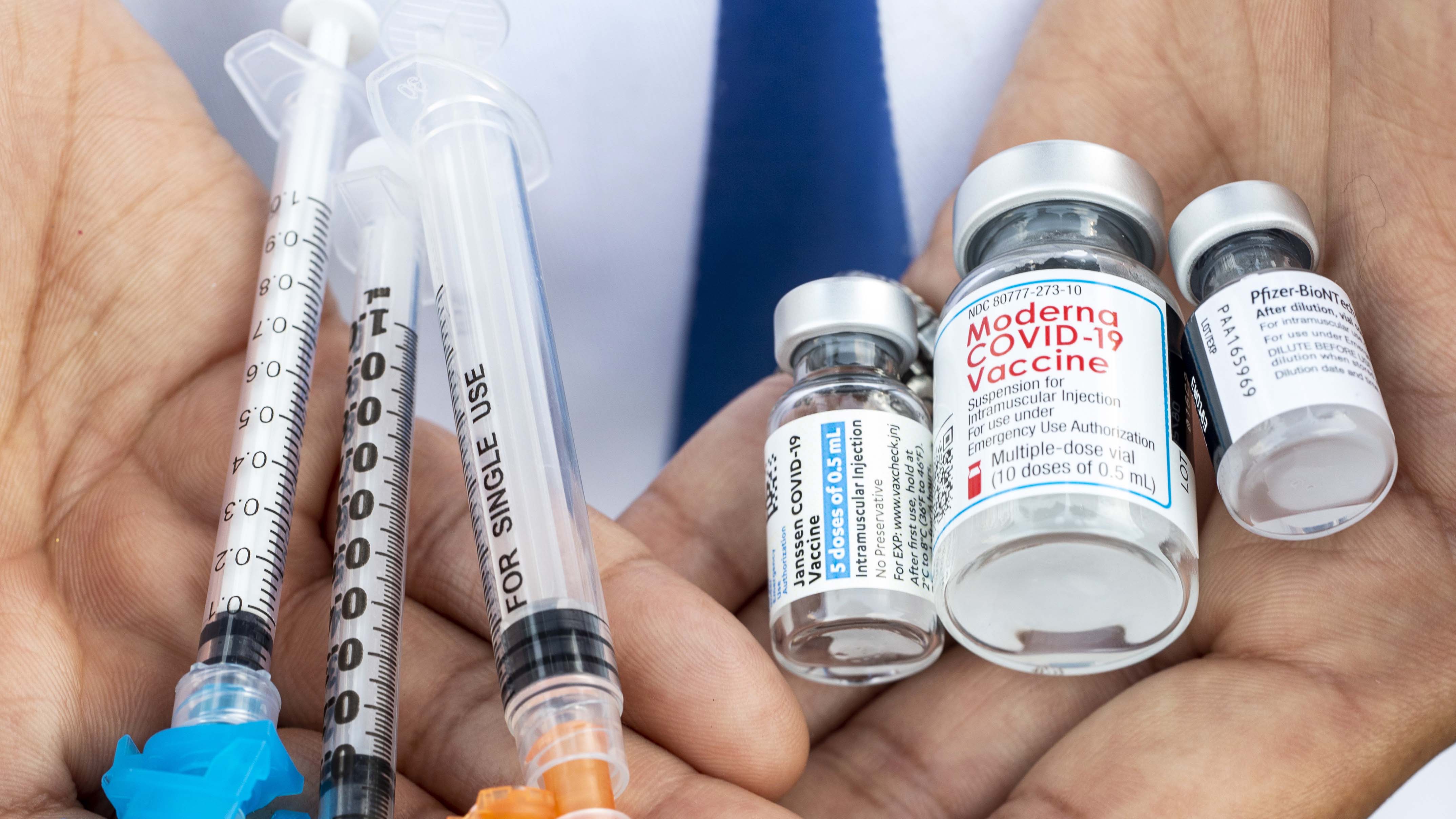Children as young as 5 are now eligible for coronavirus vaccines after clearing both the Food and Drug Administration and Centers for Disease Control and Prevention.
Full-strength Pfizer shots were already recommended for anyone 12 or older, but pediatricians and many parents have been anxiously awaiting protection for younger children to stem infections from the extra-contagious delta variant and help keep kids in school.
So what can parents expect and when? Here's what we know so far.
Where can you get a pediatric COVID vaccine in the Chicago area?
With COVID vaccines for children under 12 set to begin soon in the Chicago area, where should parents take their children to get one?
Here's a look at where parents can make appointments or request pediatric vaccinations in the Chicago area:
Walgreens and CVS
Walgreens and CVS have started administering COVID vaccines to children under 12 years old.
Walgreens began offering coronavirus vaccinations to children ages 5 to 11 starting Nov. 6. Appointments can be made at Walgreens.com/ScheduleVaccine, through the Walgreens app or by calling 1-800-Walgreens.
Walgreens said more appointments will be available in the coming weeks as the chain receives additional vaccine.
Feeling out of the loop? We'll catch you up on the Chicago news you need to know. Sign up for the weekly Chicago Catch-Up newsletter here.
Meanwhile, CVS started offering doses to younger children beginning Nov. 7.
The chain said its 1,700 locations nationwide, including more than 50 Illinois pharmacies, are taking appointments.
CVS noted that parental or legal guardian consent is required, and children must be accompanied by an adult to get their shots.
Appointments can be made online at CVS.com or through the CVS Pharmacy app.
Chicago
Chicago has already started administering vaccines.
Chicago's health department released the following list of places offering pediatric vaccinations:
● Family health care providers – CDPH recommends families first reach out to their pediatrician or family medical provider to see if appointments are available.
● CPS sites – CPS’ regional vaccination clinics and mobile school-based events will begin offering the Pfizer vaccine for ages 5 to 11 starting on Nov. 10.
- Use this link to view the schedule for the clinics.
- Use this link to view the schedule for mobile events.
- Visit cps.edu/vaccinations for more information and vaccine opportunities.
● Local pharmacies – Across the city, many pharmacy locations already have vaccines and more will receive doses in the coming weeks. Each has their own registration.
- Walgreens: Register online, call your local Walgreens or 1-800-925-4733.
- CVS: Register online, call your local CVS or 1-800-679-9691.
- Mariano's: Register online.
- Walmart: Call 1-833-886-0023, Option 1.
- Chicago Costco Pharmacies: Register online for an appointment or call a pharmacy directly.
● Select children’s hospitals will host pediatric vaccine events – check hospital websites for dates and more information. Lurie Children's Hospital is accepting appointments here.
● CDPH will host family vaccination clinics at City Colleges of Chicago. These events will offer pediatric COVID-19 Pfizer vaccines, as well as Pfizer and Johnson & Johnson vaccines and booster doses to all Chicagoans. You must be 18 or older to receive a J&J vaccine. All clinics will be open 9:00 a.m. to 2:00 p.m. Registration is required and will begin on Nov. 5 at www.chi.gov/YouthVax.
- Saturday, Nov. 13 – Richard J. Daley College, 7500 S Pulaski Rd.
- Sunday, Nov. 14 – Wilbur Wright College, 4300 N Narragansett Ave.
- Saturday, Nov. 20 – Kennedy-King College, 6301 S Halsted St.
- Sunday, Nov. 21 – Olive-Harvey College, 10001 S Woodlawn Ave.
- Saturday, Dec. 4 – Richard J. Daley College, 7500 S Pulaski Rd.
- Sunday, Dec. 5 – Wilbur Wright College, 4300 N Narragansett Ave.
- Saturday, Dec. 11 – Kennedy-King College, 6301 S Halsted St.
- Sunday, Dec. 12 – Olive-Harvey College, 10001 S Woodlawn Ave.
- Saturday, Dec. 18 – Truman College, 1145 W Wilson Ave.
- Sunday, Dec. 19 – Malcolm X College, 1900 W Jackson Blvd.
- Saturday, Jan. 8 – Truman College, 1145 W Wilson Ave.
- Sunday, Jan. 9 – Malcolm X College, 1900 W Jackson Blvd.
● Starting Nov. 15, CDPH’s in-home vaccination program, Protect Chicago At Home, will also offer pediatric vaccination for all children age 5 to 11. Make an at-home appointment at Chicago.gov/AtHome or by calling 312-746-4835.
● Standing CDPH immunization clinics will also offer pediatric COVID-19 vaccines by appointment only. This includes:
- Uptown WIC 845 W. Wilson Ave., 2nd Level (call 312-742-3227 for an appointment).
- Greater Lawn WIC 4150 W. 55th St. (call 312-745-1477 for an appointment).
● Starting Nov. 15, all CDPH-sponsored community events will offer pediatric vaccinations. For the calendar of community events, visit Chicago.gov/VaxCalendar.
Cook County
Dr. Jackie Korpics, medical director for the Cook County Department of Public Health COVID-19 Response, believes shots could start going into arms as early as Thursday.
"We are in touch with each of the more than 700 schools in our jurisdiction as well as pediatricians throughout the county to facilitate convenient vaccinations of children," the county health department said in a release. "We hope to see families coming out to get vaccinated together, particularly to be able to celebrate safe and healthy holidays with extended family and friends."
DuPage County
The DuPage County Health Department said it expects the pediatric COVID-19 vaccine to be available through many locations in the county, but shots won't begin until Nov. 15.
Pediatric vaccinations will begin at that time at a number of locations. For those looking to for appointments, the department recommends the following:
1) Check with your child’s pediatrician or healthcare provider.
2) Check with a local retail pharmacy.
3) Check with your child’s school to see if they are hosting a clinic.
4) Register with DCHD Vaccine Registration & Scheduling. Those who register will receive information via email about scheduling an appointment as soon as appointments are available.
5) Visit www.vaccines.gov to find a provider near you.
The DuPage County Fairgrounds will close on Nov. 22 "because we recognize this would not be the best care setting to meet the unique needs of the 5–11 year-old population,” the county's health department stated.
Kane County
The Kane County Health Department announced that appointments are now available for pediatric vaccinations at the Kane Vax Hub in Batavia. Vaccinations begin on Nov. 10 at KaneVax.org.
The department said more appointments will be added weekly.
Other Locations in Illinois
IDPH reported vaccines will be available at local health departments across the state, at a number of pharmacies, at pediatrician officials and other providers. Places administering the vaccine will be asked to watch a training video prior to offering them to children.
So far, roughly 2,200 providers in Illinois have registered to administer the vaccines to young patients, according to IDPH. The department is also working with schools across the state to set up vaccination clinics and plans to host hundreds of youth vaccine events.
See a full list here.
What are the potential side effects for children?
As COVID-19 vaccines for kids ages 5-11 begin, some parents have expressed concerns over the side effects that might come with the child-size shots.
Doctors, however, overwhelmingly assert the benefits of vaccinating children are clear and outweigh the risks.
While a small portion of children suffer from severe disease, it's less likely for children to develop serious complications compared to adults.
Fully vaccinating 1 million kids ages 5 to 11 would prevent 58,000 COVID infections, 241 hospitalizations, 77 ICU stays and one death, according to a modeled scenario published by the Food and Drug Administration last week. Up to 106 kids would suffer from vaccine-induced myocarditis but most would recover, according to the agency.
Children are experiencing less side effects overall, according to Dr. Jackie Korpics with Cook County Health.
But when children do encounter side effects, they're typically similar to the ones experienced by adults and usually after the second dose, too.
Dr. Daniel Donner, a pediatrician with Novant Health, said fewer kids could be developing side effects because the COVID-19 shot for the age group is one-third the size of the dose compared to the one for adults, according to WCNC, the NBC affiliate in Charlotte.
"It could be because of the lower dose," he said. "They are less likely to have those startup side effects -- feeling tired, having fevers, just not feeling well in general -- for that 2-3 day period after the shot."
Pfizer conducted a trial involving more than 3,000 children who received its vaccine and found the shots were well-tolerated.
The most common side effects were mild and comparable to those seen in a trial of teens and adults ages 16 to 25. Common side effects include injection site pain (sore arm), redness and swelling, fatigue, headache, muscle and/or joint pain, chills, fever, swollen lymph nodes, nausea and decreased appetite.
A separate trial conducted by the Food and Drug Administration produced similar results.
Side effects were generally mild to moderate, occurred within two days after vaccination, and most went away within one to two days, the agency said.
Federal regulators say they are monitoring for rare heart inflammation conditions, myocarditis and pericarditis, which have appeared in a very small number of young adults who received either the Pfizer or Moderna vaccine. There were no cases of myocarditis in Pfizer’s trial for kids, but officials said the trial may have been too small to detect the rare heart condition.
What do we know about the vaccines in kids from the trials?
Federal health regulators said child-size doses of Pfizer’s COVID-19 vaccine appear highly effective at preventing symptomatic infections in elementary school children and caused no unexpected safety issues.
In their analysis, FDA scientists concluded that in almost every scenario the vaccine's benefit for preventing hospitalizations and death from COVID-19 would outweigh any serious potential side effects in children. But agency reviewers stopped short of calling for Pfizer's shot to be authorized.
Most of the study data was collected in the U.S. during August and September, when the delta variant had become the dominant COVID-19 strain.
The FDA review found no new or unexpected side effects. Those that did occur mostly consisted of sore arms, fever or achiness.
However, FDA scientists noted that the study wasn't large enough to detect extremely rare side effects, including myocarditis, a type of heart inflammation that occasionally occurs after the second dose.
The agency used statistical modeling to try to predict how many hospitalizations and deaths from COVID-19 the vaccine would prevent versus the number of potential heart side effects it might cause. In four scenarios of the pandemic, the vaccine clearly prevented more hospitalizations than would be expected from the heart side effect. Only when virus cases were extremely low could the vaccine cause more hospitalizations than it would prevent. But overall, regulators concluded that the vaccine's protective benefits “would clearly outweigh" its risks.
Do children need to be vaccinated from COVID?
While children run a lower risk of severe illness or death than older people, COVID-19 has killed more than 630 Americans 18 and under, according to the CDC. Nearly 6.2 million children have been infected with the coronavirus, the American Academy of Pediatrics says.
Doctors at Advocate Children's Hospital said last week that while cases in children tend to be less severe than those seen in adults, "more children are being hospitalized with severe COVID-19 infection than was seen earlier in the pandemic."
The group also warned that multiple cases of a life-threatening COVID-19-related condition called the pediatric multisystem inflammatory syndrome have been reported in the Chicago area and experts still don't know the long-term effects of COVID-19 on kids.
Is it only the Pfizer vaccine that will be administered in younger children?
Both Moderna and J&J's vaccines can only be used on people 18 and older, though Moderna also is studying its shots in elementary school-aged children.
Moderna said last week that a low dose of its COVID-19 vaccine is safe and appears to work in 6- to 11-year-olds.
Moderna hasn't yet gotten the go-ahead to offer its vaccine to teens but is studying lower doses in younger children while it waits. The company said Monday, however, that it will delay filing a request for emergency-use authorization of a lower dose of the vaccine for 6- to 11-year-olds following recent guidance from the FDA.
U.S. regulators are delaying their decision on Moderna's COVID-19 vaccine for 12- to 17-year-olds while they study the rare risk of heart inflammation, the company said Sunday.
The FDA told the company Friday evening that its review could last until January, Moderna said.
Heart inflammation is an exceedingly rare risk of both the Pfizer and Moderna vaccines, and it more commonly seen in young men or boys. It’s difficult for clinical trials to detect such a rare problem. And public health officials have repeatedly stressed that COVID-19 itself can cause heart inflammation at higher rates than the rare cases caused by the vaccine.
Researchers tested Moderna's two shots for the 6- to 11-year-olds, given a month apart, with each containing half the dose given to adults. Preliminary results showed vaccinated children developed virus-fighting antibodies similar to levels that young adults produce after full-strength shots, Moderna said in a news release.
The study involved 4,753 children ages 6 to 11 who got either the vaccine or dummy shots. Moderna said that like adults, the vaccinated youngsters had temporary side effects including fatigue, headache, fever and injection site pain.
The study was too small to spot any extremely rare side effects, such as heart inflammation that sometimes occurs after either the Moderna or Pfizer vaccines, mostly among young men.
Pfizer and Moderna are studying vaccinations in even younger tots as well, down to 6-month-olds. Results are expected later in the year.
Is the dosage for children the same as teenagers and adults?
Is the Pfizer vaccine that is being evaluated for younger children the exact same vaccine that teenagers and adults received?
According to Chicago Department of Public Health Commissioner Dr. Allison Arwady, the answer is no.
While the vaccine has "the exact same ingredients" and will follow the same timeframe between doses, "it is only going to be a third the dose."
"This is because younger children have a smaller body mass and in studies, they had the same level of antibodies and protection," Arwady said. "But the lower dose makes it less likely that the 5-to-11-year-olds will have side effects."
Arwady noted that the change in dosage will also require smaller needles and different vaccine vials.
"So we won't have people pulling adult and children doses out of the same vial, there is a separate process for child vaccines," she said.
What should you do if you still have questions?
Illinois health experts acknowledged that many parents will likely have questions surrounding COVID vaccinations for children.
The state's top doctor and other pediatric health officials urged parents to discuss the decision with their doctors and ensure that any other information comes from reputable websites.
"As the state's top health officials, and as a board certified pediatrician and mom, I am urging every single parent and guardian to do this for their child," Illinois Department of Public Health Director Dr. Ngozi Ezike said. "Make a plan to get them vaccinated for COVID-19."
"I also know that there are many parents out there who aren't quite ready to be the first in line to get their kids vaccinated and who might still have questions," Pritzker said. "That's OK. There are experts who can provide you with answers and I urge you to talk to your own doctor."





